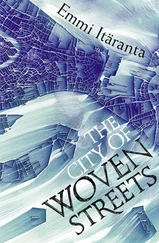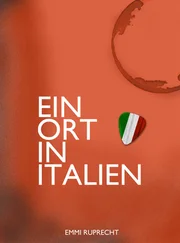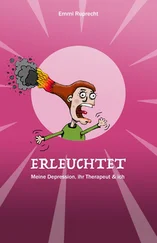‘I’ll write to you,’ she said. ‘And the New Year is only a few months away. I’ll come for a visit then.’
I didn’t know what to say, so I held her for a long time.
When she finally released me, I walked out to wait and through the window I saw her talking to my father. Their lips were moving and their expressions were changing, but the thick glass muffled the words, making them inaudible. They embraced, and I couldn’t understand why they wanted to tear their lives apart.
I turned away.
A grey-faced man walked inside the station building with a large seagrass bag on his shoulder.
A group of soldiers walked near the entrance, their boots heavy on the stones, their hands resting on the hilts of their long sabres.
A little girl in a blue summer dress was skipping rope and humming a shapeless sing-song. Her mother was eating roasted sunflower seeds and kept glancing at her watch.
Eventually my father descended from the train.
‘Shall we go?’ he asked.
I looked at my mother, who was sitting behind the window, colourless, faint as a faded picture in an old book in the middle of the bright day. She looked at me while we walked away, looked even when I was no longer looking back, I am certain of it. If she wished to change her mind and step off the train and return to the tea master’s house with us, she did not act upon it.
Before starting the journey towards home, we went shopping at the Qianese market. As soon as we got there, I knew our destination was a stand where a tall, dark-skinned, slightly crooked woman sold items. Her name was Iselda, and I remembered her from my childhood. My father asked her to present us with her best-quality teas. Iselda placed three small knots of fabric on the sales table and opened them. I expected my father to examine them one by one, but instead he nodded to me. I had never before been allowed to choose the type of tea without his directions.
I took each knot of fabric in turn in my hand. The leaves of the first tea were green-black and oblong, and it smelled slightly sweet. The second tea was a brighter green in colour, its leaves tied up in large buds that would open into flowers once hot water was poured on them. Its scent was fresh and light – I could imagine that combined with the water of the fell spring it would produce an extraordinary aroma. The greenness of the third tea was silver-brushed and its leaves were twisted into the shape of drops. What determined it, however, was the scent. The scent of the third tea flowed . That is the only way I could describe it. It was the scent of freshly picked tea, but it was also the scent of humid earth and of wind sweeping shrubs, and it wavered like light wavers on water, or shadow: one moment it was strong in my nostrils, the next it fled nearly out of reach only to return again.
‘This one,’ I said and handed the tea to my father.
‘How much?’ he asked the tradeswoman.
Iselda mentioned the price of one liang , as was customary when trading tea. When I heard it, I was sure my father would refuse. Yet his expression didn’t even stir. He told Iselda a lower price. I prepared myself for a bargaining that would take its time, but Iselda only looked at him for a moment and then nodded.
‘We are taking half a liang ,’ my father said. ‘That should be enough for the graduation ceremony.’
He dug an empty fabric pouch from his bag, and Iselda measured the tea into it. We also bought a couple of liang of another, cheaper tea for everyday use, and some spices and groceries that couldn’t be found in the village.
On the way home I tried not to look at the empty front seat of the helicarriage. I looked back towards the city, at the dusty plain and the narrow thread of the sea on the horizon, radiant in the late-afternoon sun like the scale coat of a giant dragon disappearing slowly from sight.
After my mother was gone, my father occupied himself entirely with the preparations of Moonfeast. He had hired a few men from the village to help restore the teahouse and the garden, Sanja’s father Jan among them. I’d noticed Jan spending a lot of time looking at the expensive wood and the few fine furnishings my father had ordered from the cities; Jan was a skilled builder, but he rarely had good materials to work with. While my father was busy supervising the repairs, cleaning the house and collecting the harvest were left to me. The berry bushes and cherry trees had suffered somewhat from the turmoil caused by the water searching, and the soldiers had overturned part of the root vegetable patch. Nevertheless, not all had been lost, and I was kept busy cooking gooseberry jam and drying cherries and plums for the winter, tapping seeds from sunflowers and amaranth into sacks, picking almonds and pulling carrots from the soil. On top of these things I had to order feastcakes from the baker, check the waterskins, get my tea master’s outfit from the village tailor and go through the ceremony with my father once a day.
He seemed to have decided he wouldn’t speak of my mother’s departure. On the fifth day after she left I was cleaning the house vigorously. My father saw me carrying a water bucket, a scrubbing-brush and some wet cloths towards my mother’s study. When I placed them on the floor and pushed the door open, he said, ‘Don’t.’
I looked at him, and then I looked away, because I didn’t want to see his face.
‘Leave it the way it is,’ he said.
‘If you say so,’ I replied, but I thought: it cannot remain that way. Not if you want it, and not if I want it. Dust will gather around the legs of the shelves and spiders will weave their webs in the corners, and mute book pages will grow yellow between the covers. The glass of the windows slips downwards like slow rain, even if we don’t see it, and the landscape outside is different every day: the light falls from another angle, the wind tugs at the trees slower or faster, the greenness of the leaves draws away and one ant more or less walks on the trunk. Even if we don’t see it right away, it is all happening; and if we look away long enough, we will no longer recognise the room and the landscape, when we eventually look at them again. This house is different since she left, and we both know it.
My mother sent messages from along her journey. They had a light, in-awe-of-the-big-world tone to them.
I’ve never seen such a huge port in my life, she wrote from New Piterburg. It has grown so much in the past fifteen years. And you should see the people who travel on these trains! Yesterday I sat at dinner with a family of five who had come all the way from the Pyrenees by boat and were on their way to Ural. I swear the only thing preventing their noisy kids throwing the train off the tracks was the presence of soldiers. I’m thinking of you. Hugs, L.
Not as much as we are thinking of you, I replied to her in my mind. You have in your reach the whole world unmarred by our footprints; they cannot wear away quietly under your eyes. All we have is this house and its lack of you, and we protect the imprint you left behind, so it would stay here a little longer, so you would still recognise it as your own, when you come back. If you do.
I got up early on the morning of Moonfeast day. The tea master’s outfit was hanging from the curtain pole in front of the slightly open window, swaying in the draft. It wasn’t yet time to wear it. My father had told me the day before we would take a walk to the fell after breakfast. I guessed we were going to fetch water from the spring for my graduation ceremony, but I knew there was something else, too. Otherwise he wouldn’t have asked me to go with him. I dressed in simple everyday clothes and sturdy trekking shoes, and had the rest of the millet porridge he had left on the table for me. I filled a small waterskin, hung it on my shoulder and shoved a couple of sunflower-seed cakes into my pocket. I picked the insect hood up from the clothes rack at the entrance on my way out.
Читать дальше
Конец ознакомительного отрывка
Купить книгу












